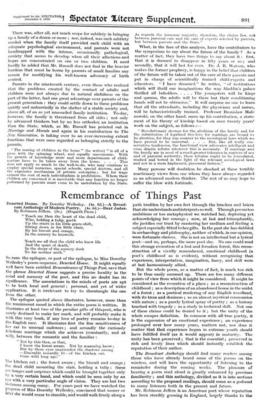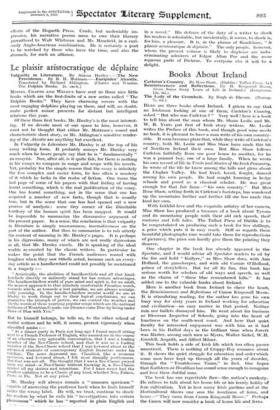Remembrance of Things Past
Deserted House. By Dorothy Wellesley. • (4s. 6d.)—A Broad- cast Anthology of Modern Poetry. (4s. 6d.)—Dear Judas. By Robinson Jeffers. (Ss.) (Hogarth Press.) " Teach me then the heart of the dead child, Who, holding a tulip, goeth
Up the stairs in his little grave-shift, • Sitting down in his little chair, By his biscuit and orange, In the nursery he knoweth.
Teach me all that the child who knew life
And the quiet of death,' In the deeps of the nursery dusk To his mother saith."
So runs the epilogue, or part of the epilogue, to Miss Dorothy Wellesley's poem-sequence, Deserted House. It might equally well have been entitled Remembrance of Things Past, save that the phrase Deserted House suggests a precise locality in the mind and memory of the poet, and this no doubt has its significance. The associations in the minds of poets are apt to be both local and general ; personal, and yet of wider application. It is irrelevant to try to disentangle the one from the other.
The epilogue quoted above illustrates, however, more than the reminiscent mood in which the entire poem is written. It illustrates at least two of the peculiar gifts of this poet, who is surely destined to make her mark, and will probably make it with this very book, if any love of poetry remains to-day in the English race. It illustrates first the fine sensitiveness of her ear to unusual cadences ; and secondly the curiously felicitous marriage which she achieves (constantly, and at
ill), between the romantic and the familiar :
" Not by this then, or that, I know the forest aware. Not by reasoning know ; But by those eyes unattended the shadows among —Emeralds inwardly lit—of the kitchen cat. Gone wild long ago."
The kitchen cat ; the forest aware ; the biscuit and orange ; the dead child mounting the stair, holding a tulip ; these are images and surprises which could be brought together only by a very certain hand, and which could be seen only by an eye with a very particular angle of vision. They are but two instances among many. For years past we have watched the Progress of Miss Dorothy Wellesley, convinced that sooner or later she would cease to stumble, and would walk firmly along a
path trodden by her own feet through the bracken and briers that she understands and interprets so well. Through poems too ambitious or too metaphysical we watched her, deploring yet acknowledging her courage ; now, at last and triumphantly, she justifies our trust by mastering her medium and finding a subject especially fitted to hergifts. In the past she has dabbled in archaeology and philosophy, neither of which, in our opinion, were fortunate choices. She is not an intellectual but a lyrical poet—and so, perhaps, the more poet she. No one could read this strange evocation of a lost and forsaken forest, this recon- struction of a vividly remembered, emotional childhood (a poet's childhood as is evident), without recognizing that experience, interpretation, imagination, fancy, and skill were at last harmoniously allied.
But the whole poem, as a matter of fact, is much too rich to be thus easily summed up. There are too many different points of view from which it might be considered. It might be considered as the evocation of a place ; as a reconstruction of childhood ; as a description of an abandoned house in the midst of a forest ; as a poetical rendering of any English woodland, with its trees and denizens ; as an almost mystical communion with nature ; as a purely lyrical spray of poetry ; as a history touched with tragedy ; as a study in technical skill. Not one of these claims could be denied to it ; but the unity of the whole escapes definition. In common with all true poetry, it is the expression of an emotional experience ; an experience prolonged over how many years, matters not, nor does it matter that that experience begun in extreme youth should have fulfilled itself (as it would appear) in maturity. The unity has been preserved ; that is the essential ; preserved in rich and lovely lines which should instantly establish the reputation of their author.
The Broadcast Anthology should find many readers among those who have already heard some of the poems on the wireless, and will have the opportunity of listening to the remainder during the coming weeks. The pleasure of hearing a poem read aloud is greatly enhanced by previous familiarity ; and this anthology, divided as it is into sections according to the proposed readings, should come as a godsend to many listeners both in the present and future.
Mr. Robinson Jeffers is an American poet whose reputation has been steadily growing in England, largely thanks to the
efforts of the Hogarth Press. Crude, but undeniably im- pressive, his narrative poems seem to owe their literary parenthood to Walt Whitman and Mr. Masefield, in a curi- ously Anglo-American combination. He is certainly a poet to be watched by those who have the time, and also the stomach, for such an alliance.



























































 Previous page
Previous page